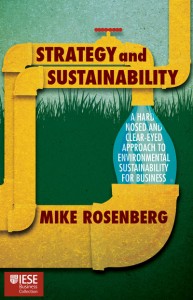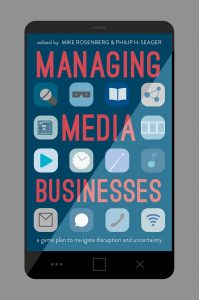 Business and environmental sustainability are not natural bedfellows. Business is about making money. Sustainability is about protecting the planet and the life forms on it. Business is measured in months, and quarters. Climate change, deforestation, and the reduction in biodiversity occur over decades or even centuries. Business is about maximizing profit. Sustainability often requires significant short term costs to secure a very long term benefit. It’s difficult to bridge the gap.
Business and environmental sustainability are not natural bedfellows. Business is about making money. Sustainability is about protecting the planet and the life forms on it. Business is measured in months, and quarters. Climate change, deforestation, and the reduction in biodiversity occur over decades or even centuries. Business is about maximizing profit. Sustainability often requires significant short term costs to secure a very long term benefit. It’s difficult to bridge the gap.
Strategy and Sustainability encourages its readers to move beyond the hype and takes a decidedly pro-business, fact based point of view, recognizing the complexity of the issues at hand and the strategic choices businesses can make. It blends the work of some of the leading academic thinkers in the field with practical examples from a variety of business sectors and geographies and offers a roadmap with which Sr. Management might think about engaging with the topic, not to save the planet but to fulfill its medium and long term responsibility to shareholders and other stakeholders.
 The basic premise of Strategy and Geo-politics is that Senior Executives do not know as much as they could about many of the political and geo-political issues at play in countries that they are currently or planning to do business in and that faced with overwhelming global complexity they rely on oversimplified frameworks to make decisions and complex matrix organizations to make things happen.
The basic premise of Strategy and Geo-politics is that Senior Executives do not know as much as they could about many of the political and geo-political issues at play in countries that they are currently or planning to do business in and that faced with overwhelming global complexity they rely on oversimplified frameworks to make decisions and complex matrix organizations to make things happen.
To make matters more complicated, modern matrix organizations no longer have Sr. Managers in place at the country level who can reliably inform Sr. Management at headquarters and also act as corporate ambassador at the national level. Even when companies do have a local representative, many of these people are on rotational international assignments and sometimes do not find the time to learn the local languages or dig deeply into the country’s history and political situation.
For Sr. Executives and Board Members of firms pursuing international expansion, Strategy and Geo-politics provides a framework with which they can approach global complexity at a deeper level.
As the world gradually shifts to a multi-polar and potentially less stable geo-political structure, only those firms which acquire a better capability to foresee and prepare for change will prevail over the long term. Firms with such capabilities, moreover, will be in a position to make a positive impact on the world as it develops.
 Do newspapers, magazines or books have a future? Will terrestrial television or cable services exist as meaningful players in five years’ time? Is there a way to make multiple consumption platforms work together in a way that extracts the revenue needed to support the creation and development of quality content? While more and more content is being published, fewer and fewer businesses are finding a way to do so profitably and sustainably.
Do newspapers, magazines or books have a future? Will terrestrial television or cable services exist as meaningful players in five years’ time? Is there a way to make multiple consumption platforms work together in a way that extracts the revenue needed to support the creation and development of quality content? While more and more content is being published, fewer and fewer businesses are finding a way to do so profitably and sustainably.
Your answers to these questions that face your media or entertainment business will depend on your frame – a frame based on experience gained in days that were less uncertain, less fluid and much, much simpler. Those frames need to be broken if you are to survive in times of such rapid change.
This book is based on IESE’s Advanced Management Program in Media & Entertainment, which IESE Business School has been running in New York and Los Angeles since 2011. It combines contributions from leading professors and practitioners, as well as real-life case studies, to establish a base upon which you can start to build the set of managerial tools that you will need to manage fast-changing media and entertainment businesses.
Managing Media Businesses was awarded the 2018 Robert Picard Book Award given by the Media Management, Economics, and Entrepreneurship division of the Association for Education in Journalism and Mass Communication (AEJMC).
 Over the years I have developed my own approach to help people think through their professional options and the essential idea of Learning to Fly is to take people through that approach.
Over the years I have developed my own approach to help people think through their professional options and the essential idea of Learning to Fly is to take people through that approach.
The world was already changing before the outbreak of Covid-19 and Russia’s invasion of Ukraine. The events of the last few years, however, have only accelerated changes caused by digitalization, geopolitical tensions, and the looming climate crisis.
Given the situation, it is not surprising that I find that the executives, middle managers, and MBA students that I normally interact with are increasingly concerned with their career prospects.
What does surprises me, however, is that most people separate their concerns about the changing world from their discussions about career management and their future prospects as if the two issues had nothing to do with one another. Another way to say this is that people look at the problem of what to do with their professional life in static rather than dynamic terms.
My conviction is that each of us has the ability and even the responsibility to think through how we feel the major trends affecting the world will play out when making choices about where to work, what to do, and where to live.
In 1970, Richard Boles published What Color is Your Parachute which had an impact on me when I graduated from Business School in the 1980s. The metaphor is that each of us needs to choose what to do and where to live in a way that is consistent with what is important to us.
In these complex, turbulent times, I fear we no longer have the luxury of choosing a parachute and gently floating to the earth. To take the metaphor a little bit further, what each of us needs is a winged suit, like the ones BASE jumpers use, to be able to really control ride the air currents and thermals and respond quickly to changing situations.
I refer to this idea as learning to fly.

